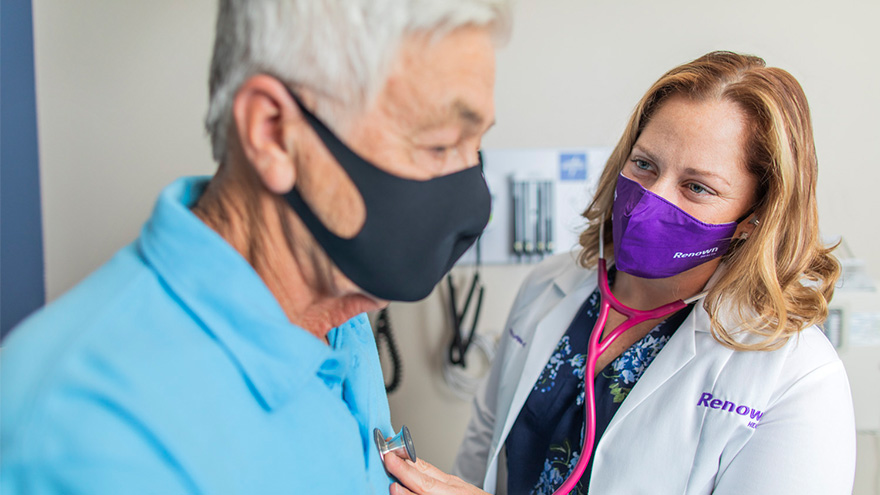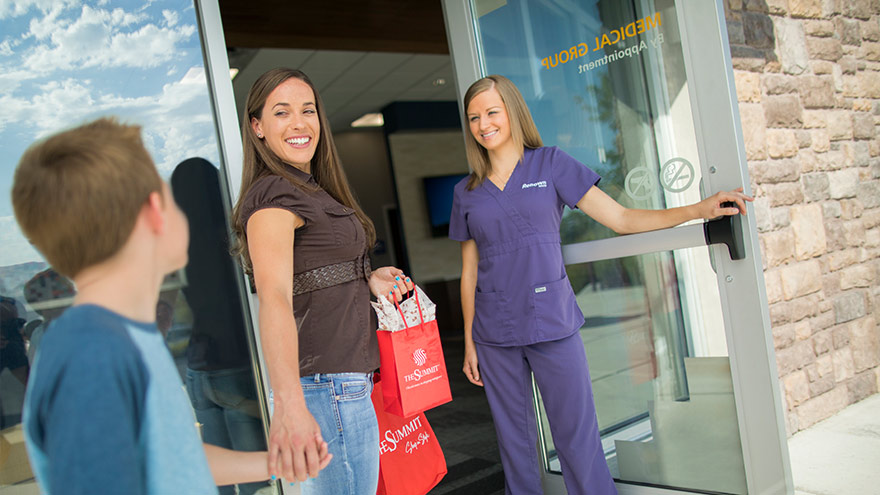Search
Results for 'primary care'
Clear-
Primary Care vs. Urgent Care vs. The ER
When seeking medical care, there are several different provider types and options from which to choose. For example, you may have asked yourself a common question: Should I go to my primary care provider, urgent care or the emergency room? Sarah Herbert, APRN with Renown Medical Group – South Carson, provides guidelines to help you easily make this decision. When should you go to the Emergency Room (ER)? Making a visit to the ER should be reserved for severe symptoms and/or life-threatening conditions, including: Chest pain Severe shortness of breath or difficulty breathing Weakness or numbness on one side Slurred speech Fainting/loss of consciousness Continuous bleeding or major open wounds Severe allergic reactions Coughing or throwing up blood Drug or alcohol overdose Sharp pain in lower abdomen Severe dehydration and not responding to nausea medication (needing IV fluids) High fever that does not get better with medicine Serious burns Broken bones/dislocated joints Head trauma Find an Emergency Department Near You If you’re still unsure of where to go for appropriate medical care, it’s best to check with your primary care physician. And remember, for a life-threatening emergency, call 9-1-1 immediately!
-
Getting Care During The Holidays
Although coined the most wonderful time of the year, the holiday season can unfortunately bring with it injuries and illness. Woke up on Christmas morning with the gift of a sore throat and fever? Sliced your finger carving the delicious turkey you spent all day preparing? While no one ever wants to cut their festivities short, the reality is we should all be prepared with how and where we will receive care should we need it. Are Renown Urgent Care Facilities Open During the Holidays? Renown Urgent Care sees patients 365 days a year, with limited hours on holidays, for medical concerns that are urgent but not life-threatening. Urgent care providers can treat everything from cuts and burns to fevers and allergic reactions and appointments can be booked ahead of time online. If no appointments are available, you may also walk into any of our various urgent care facilities. Conditions and injuries treated at urgent care include: Cuts Fractures Burns Sprains Fevers Allergic reactions Animal bites Rashes Sore throats Does Renown Offer In-Home Care Options on Holidays? If you’d like to see a healthcare provider without leaving the house and exposing others to illness, consider a Virtual Urgent Care Visit. This convenient video conference service allows you to see an urgent care provider from the comfort of your home using a cellphone, computer or tablet with video capabilities. Providers are available for video chat from 9 a.m. to 6 p.m. Monday through Friday, and 10 a.m. to 4 p.m. Saturday and Sunday. Scheduling a Virtual Visit is easy directly through MyChart. Login to MyChart and click on the "Talk to a doctor" video icon within the portal to get started. Before scheduling, be sure your illness or injury is included on the following list to ensure a healthcare provider can assist you virtually: Common cold and cough symptoms Muscular, tendon or joint pains not caused by injury Allergy or sinus symptoms Pink eye (no trauma or something in the eye) Urinary discomfort Diarrhea without vomiting Rashes or skin sores Backache Nail problems Screening examination for sexually transmitted illness (without symptoms) Medication refills (not controlled substances) When Should I Go to the Emergency Room? Urgent care and Virtual Visits are great options when experiencing minor illness or injury and it’s too urgent to see your primary care provider. Renown Emergency Rooms are designed to treat patients who need immediate attention for emergencies, such as: Burns Allergic reactions Broken bones Stitches Skin infections Heart attack Stroke Rashes Venomous stings and bites Asthma attacks Choking or poisoning Fainting, dizziness or confusion Head injuries Seizures Severe bleeding Difficulty breathing Severe headache Eye injuries Severe pain Renown Emergency Rooms are open 24 hours a day, 7 days a week, 365 days a year. For life-threatening emergencies, always call 9-1-1 immediately. We know there is nothing jolly about getting sick or injured during the holidays, but we hope you can find some comfort knowing that Renown Health is here with the care you need, when you need it most.
-
When to Seek Care for Abdominal Pain
Abdominal pain is one of the most common complaints that brings individuals to the emergency room. We spoke with emergency physician Bret Frey, MD, to ask about when and where to seek care for abdominal pain. Dr. Frey advises that any time you feel something is developing inside your body that is substantially different from what is normal for you, understand that something is wrong. He further explains that warning signs of an acute medical situation include fever, vomiting or a rapid change in function and ability to move due to pain. These symptoms indicate that one needs to be evaluated by a medical professional. This evaluation will include the care team conducting an examination and asking a series of questions to determine if additional diagnostics, such as lab work or imaging, are needed. Be prepared to discuss where the pain is and what it feels like, in addition to how long it’s been bothering you and if it’s constant or intermittent. While appendicitis often comes to mind when thinking about abdominal pain, Dr. Frey says that this is not the bulk of cases that the Emergency Department sees. In fact, often the pain does not have a specific diagnosis, but our team of board-certified emergency physicians are experienced in assessing and caring for those experiencing the acute symptoms he described. “We often don’t come away with an answer about exactly what it is, but we substantially rule out life threats in a very methodical and systematic way,” said Frey. The abdomen includes many organs, including the stomach, liver, small and large intestines, gallbladder and pancreas. In addition, pain stemming from your chest, pelvis or back may be felt in the abdominal area. If you are experiencing abdominal issues that are persistent but not an emergency, talk to your primary care doctor about what you are experiencing, and be prepared to review the history of this pain, medications, allergies and diet. He or she will be a good partner to review conditions such as gas, heartburn, constipation, diarrhea, inflammation or menstrual and ovulation pain. Drinking plenty of water is always an important part of supporting your health.
-
10 Things You Might Not Know About Urgent Care
Visiting a Renown Urgent Care location is an excellent option when you have a non-severe condition, such as a skin rash or sore throat, can't get in to see your primary care provider in a timely manner or if you need an appointment after regular business hours. To learn more about the ins and outs of Urgent Care, we spoke to David Lemak, MD, Division Chief Urgent Care, who let us know some reasons to visit Urgent Care, how to make your visit as efficient as possible, and more. Remember, for a life-threatening emergency, call 911 immediately! Urgent Care is similar to a Primary Care provider Urgent Care providers can do most of the things your Primary Care provider can do, with visits billed the same as an office visit. If you could put the word “severe” in front of your reason for visiting Urgent Care, please go to the emergency department right away For a list of what is an appropriate visit for Urgent Care click here. Also, we recommend that babies 2 months old and younger should go to the Renown Children’s Emergency Department, not Urgent Care. Renown Health has 10 Urgent Care locations across northern Nevada There are five locations in Reno, two in Sparks, one in Carson City, one in Fernley and one in Fallon. For a complete list of Renown Urgent Care locations, click here. Many of your Urgent Care needs can be accomplished via a virtual visit, from the comfort of your home or office Conditions Appropriate for a Virtual Visit Included: - Common cold and cough symptoms - Muscular, tendon or joint pain not cause by injury - Allergy or sinus symptoms - Pink eye - Urinary discomfort - Backache - Sexually transmitted illness screening - Rashes or skin sores - Medication refills (no controlled substances) Some conditions are not appropriate for a virtual visit. They include: - Chest or abdominal pain - Shortness of breath - Traumatic injuries - Dizziness or confusion - Bleeding - High fever - Persistent vomiting - Loss of vision - Substance abuse or psychiatric problems Book ahead for shorter wait times, but remember walk-ins are always available. Click here to make your appointment. This booking page conveniently shows the next available appointment at each location. Typically, mornings and late afternoon (right before dinner time) have the shortest wait times if you plan on walking in. You will be asked to wait in your car when you arrive at a Renown Urgent Care facility. While you wait (or even before you arrive), patients are encouraged to complete all registration paperwork and co-pay information online. Urgent Care is great for visits such as back-to-school physicals, camp physicals, commercial motor vehicle exams and more. Sometimes you cannot get in to see your primary care provider to meet the last-minute deadlines for certain school or work-related physicals. Many of these appointments can be completed at Urgent Care; we just recommend you call ahead and confirm that our facility offers what you need. An Urgent Care provider can virtually order a PCR COVID-19 test. Whether you have a possible exposure, are not feeling quite like yourself or need a negative test for upcoming travel, a COVID-19 test can be ordered for you. The cost for a visit to Urgent Care is dependent on your benefits, but the visit is billed the same as a standard office visit. If you don’t have insurance, a basic visit to a Renown Urgent Care will cost $125.
Read More About 10 Things You Might Not Know About Urgent Care
-
Make Hydration a Priority for Your Health
As the temperatures skyrocket and we return to more outdoor activity, one thing is certain: you must hydrate to stay cool, healthy, and functional. But how much water do you need, and what are some easy ways to ensure you are getting enough? Aurosis Reddy, DO a family medicine provider with Renown Medical Group, shares what you need to know. How Much Water Is Enough? Experts agree that recommended daily water intake can vary depending on different factors such as your weight, metabolism, location, diet, physical activity, and health. As a rule of thumb, women should aim for a daily fluid intake of 91 ounces, and men should aim for 125 ounces. It is important to listen to your body and recognize when you might need to increase your water intake. For example, if you’re partaking in strenuous exercise, or spending time outside in the heat, you’ll want to give your body more water and electrolytes to function properly. How Can I Tell If I Am Dehydrated? Decreased coordination Fatigue Less urination Dizziness Dry, sticky lips and mouth Increased thirst Headache
-
Attending Burning Man? Health Tips From Renown
Renown Health welcomes you back from Burning Man. To make sure you have the support you need, here are some tips on where to get healthcare after your return from the playa. Our urgent cares see patients 365 days a year for medical concerns that are urgent but not life-threatening. This can include fractures, cuts, burns, sprains, fevers, animal bites, rashes, sore throats and fevers. Where To Get COVID-19 & Mpox Tests in Reno-Sparks Renown Health’s emergency rooms do not provide walk-in COVID-19 or Mpox testing for patients. If you are experiencing symptoms related to COVID-19 or Mpox, we recommend you make an appointment with your primary care provider or visit one of our urgent care locations. Testing for COVID-19 is also available at local pharmacies in the Reno-Sparks area. Please visit Washoe County's COVID-19 page to learn more.
Read More About Attending Burning Man? Health Tips From Renown
-
Your Ultimate Cold and Flu Survival Guide
While viruses can attack year-round, colds, flus and other respiratory illnesses are typically more prevalent during fall and winter. People spend more time indoors, which allows viruses to pass more easily from one person to another. The cold, dry air can also affect the respiratory system, making it more susceptible to germs. According to the CDC, flu activity in the U.S. often begins to increase in October and peaks between December and February. “Flu season” can last as late as May. When it comes to the cold and flu, prevention and preparation are key. Getting the flu shot and a COVID-19 vaccine is the first and most crucial step in protecting against these two respiratory illnesses. Preventative actions, such as washing your hands, covering your mouth and nose when coughing or sneezing and getting enough sleep can also help you avoid getting sick. However, despite your best prevention efforts, the time may come this winter when you start to feel a little scratch in your throat or a fever coming on. By taking steps ahead of time to assemble a cold and flu survival kit, you’ll be more prepared for whenever illness strikes, allowing you to stay home, rest and avoid spreading germs. Tips for Managing Symptoms Keep these tips in mind to ease your cold or flu symptoms: Stay home and rest Drink plenty of fluids Treat aches and fever with over-the-counter medication such as ibuprofen or acetaminophen Manage a cough with over-the-counter expectorants or suppressants Run a humidifier or sit in a steamy bathroom to ease congestion What to Stock in Your Flu Survival Kit Be ready when a cold or the flu strikes by having a flu survival kit filled with these get-well essentials stocked in your pantry, fridge and medicine cabinet: Over-the-Counter Medications: Take advantage of over-the-counter medications to make yourself feel better and ease most common flu symptoms of fever, headache, cough, muscle aches, sore throat, and runny or stuffy nose Pain relievers - Ibuprofen (Motrin and Advil) or Acetaminophen (Tylenol): for fever and aches Decongestants: for sniffles and congestion Cough expectorant (guaifenesin): for a “wet” cough to help clear secretions from the lungs Cough suppressant (dextromethorphan/DM): for a severe “dry” cough to block the cough reflex Cough syrups and drops Drinks: Water Herbal tea Low-sugar sports drinks Pedialyte Foods: Chicken soup Broth Vitamin C-containing fruits and vegetables Oatmeal Toast (add some avocado, honey or egg) Miscellaneous items: Tissues Lozenges Protective mask Thermometer Humidifier When to Seek Care and Where to Go Most healthy adults who have a cold, the flu, or other mild respiratory illnesses don’t need to see a care provider and will recover at home with self-care measures. Because these are viral illnesses, antibiotics won’t work against treating them. Your care provider may be able to prescribe an antiviral medication that can relieve your symptoms and shorten the duration and severity of your illness; however, this needs to be started within 48 hours of symptom onset and is often only prescribed to individuals at high risk for developing complications from the flu or those experience severe symptoms. Primary Care or Urgent Care Contact your primary care provider or visit an Urgent Care if you are at an increased risk, including those who: Are 65 years of age or older Have chronic medical conditions Are pregnant or recently gave birth Have a weakened immune system Find a primary care provider If you are otherwise healthy and not at increased risk of complications, seek medical advice if your flu symptoms are unusually severe, such as mild difficulty breathing, a severe sore throat, coughing that produces a lot of green or yellow mucus, or feeling faint. Emergency Care Go to the Emergency Department if you are experiencing emergency warning signs such as severe pain (chest, abdomen), concern for heart attack or stroke (slurred speech, new localized weakness), severe dehydration (needing IV fluids) or severe shortness of breath.
-
6 Tips for Safe Snow Shoveling
While the appearance of a winter wonderland in your yard can be a welcome one, an accompanying aspect is not: the idea of clearing your driveway and sidewalks. The sometimes-daunting task of snow shoveling is a repetitive activity that can cause muscle strain to the lower back and shoulders. However, by following the tips below, you will spend more time appreciating your winter wonderland -- when your sidewalk and driveway are all clear, that is. But, we all know that injuries happen, and if you do find yourself with back pain that does not resolve in a few days, contact your primary healthcare provider, or visit a Renown Urgent Care. Another way to avoid injury during strenuous activity, or help heal an injury that won't go away, is to work with a physical therapist who can offer at-home exercises to keep your body strong. 6 Tips for Safe Snow Shoveling Following these tips from the American Physical Therapy Association can help you avoid injuries: Lift smaller loads of snow, rather than heavy shovelfuls. Be sure to bend your knees and lift with your legs, rather than your back. Use a shovel with a shaft that lets you keep your back straight while lifting. A short shaft will cause you to bend more to lift the load. Using a shovel that’s too long makes the weight at the end heavier. Step in the direction where you are throwing the snow to prevent the low back from twisting to help prevent “next-day back fatigue.” Avoid excessive twisting because the spine cannot tolerate this motion. Bend your knees and keep your back as straight as possible so that you are lifting with your legs. Take frequent breaks when shoveling. Stand up straight and walk around periodically to extend the lower back. Backward bending exercises while standing will help reverse the excessive forward bending of shoveling. Stand straight and tall, place your hands toward the back of your hips and bend slightly backward for several seconds. When in doubt, ask for help. The Reno community is a generous one and you can typically find snow shovelers for hire on local message boards like Nextdoor and Facebook. Or, if you have a kid in your neighborhood, they might be looking to make some extra money on a snow day.
-
Virtual Visits – Healthcare You Need At Home
Virtual visits are basically secure, video conferencing visits with your health provider. Of course if you are sick, you want to avoid going outside of your house. With Renown Health’s virtual visit program, you can now see a provider from the comfort of your own home. As we work to keep all of our patients home and healthy, we’re here for any ongoing healthcare needs you have. There are two easy ways to access a virtual visit with Renown Health. If you need an urgent care visit, you can get in line using your MyChart account You can make a virtual visit with some Renown Health providers you see currently Virtual Urgent Care from a Renown Provider By using MyChart, you can now login and request to “Talk to a Doctor.” After filling in some information and confirming your healthcare concern, you will be put into a virtual line. The healthcare team will notify you by text or email when a provider is ready to talk to you virtually. Virtual urgent care visits are available for all ages. Get To Know MyChart Virtual urgent care visits are available for all ages, and can address: Common cold and cough symptoms Muscular, tendon or joint pains not caused by injury Allergy or sinus symptoms Pink eye Urinary discomfort Diarrhea without vomiting Rashes or skin sores Backache Nail problems Screening examination for sexually transmitted illness (without symptoms) Medication refills (not controlled substances) Symptoms for In-Person Urgent Care Visits Shortness of breath Chest pain Abdominal pain Numbness or weakness of any location that is new Traumatic injuries (including eye injuries or something in the eye) Severe pain of any other body location Dizziness or confusion Bleeding from any location High fever (greater than 102 degrees for all ages) Persistent vomiting Loss of vision Ear pain Substance abuse or psychiatric problems Virtual visits are open 9 a.m. through 6 p.m. Monday-Friday and 10 a.m. to 4 p.m. Saturday and Sunday for Nevada residents. Renown Provider Virtual Visits Many primary and specialty care appointments for adults and children are now available virtually. If you have a provider with Renown Medical Group, call 775-982-5000 to see if you can have a virtual appointment from the comfort of your home. MyChart Assistance If you need assistance with your MyChart account, please call 775-982-6686. For all other questions about scheduling and appointments, please call 775-982-5000.
Read More About Virtual Visits – Healthcare You Need At Home








